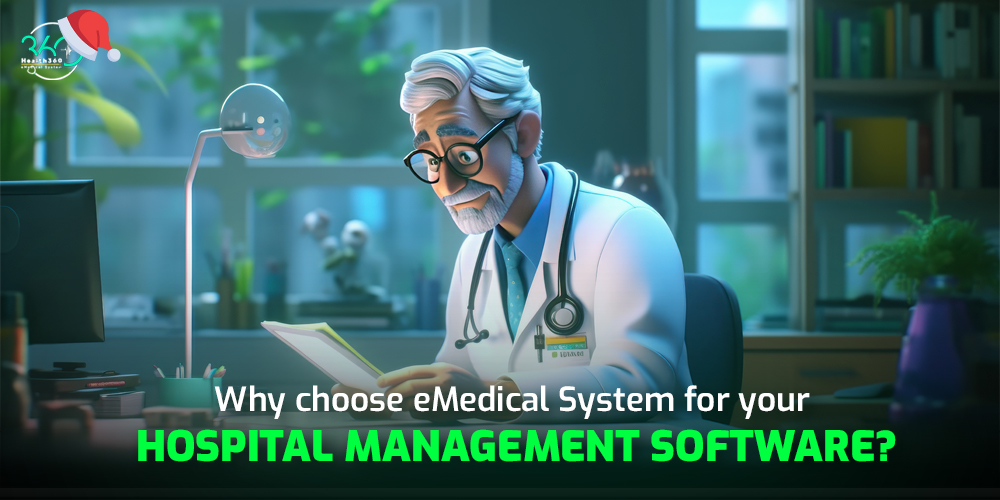
Why choose eMedical System for your hospital management software?
We have been in an extreme situation in need of a well-versed hospital management software lacking the traditional method. eMedical systems have emerged as transformative solutions, reshaping the way medical services are delivered and managed. Online technology can manage many services at the same time. The efficiency of management can result in the efficient handling of patients. The health care service can be provided without any obstacles.
This article discusses the intricacies of eMedical systems, exploring their key advantages and the crucial role they play in modern healthcare management.
Understanding eMedical System
At its core, an eMedical system is a hospital management software designed to streamline and enhance various aspects of healthcare operations. From patient records and appointment scheduling to billing and telemedicine, these systems integrate seamlessly into existing workflows, offering a holistic approach to healthcare management.
The approach towards the healthcare centers is taking a diversion. The efficient software for hospitals and clinics provides support to the patient at the correct time. The comfort of online service has reached the hospital system too.
Key Advantages
When we develop something or use something, we expect new advantages over traditional methods. In the eMedical System, there are so many advantages for patients and health care service providers. The list of advantages is:
Enhanced Efficiency and Productivity
The effortless operations of booking the service, checking its availability, and managing the service increase productivity. Furthermore, automated processes, like electronic health record (EHR) management, reduce manual errors and wait times for booking, ensuring quick access to patient information. Consequently, this process eliminates the repeated paperwork and avoids many issues, streamlining the overall workflow for healthcare providers and enhancing the efficiency of service delivery.
Improved Patient Experience
With user-friendly interfaces and simplified appointment scheduling, eMedical systems contribute to an enhanced patient experience. Additionally, patients can easily access their medical records, receive timely reminders for appointments, and engage in telehealth consultations from the comfort of their homes. This seamless integration of technology not only improves accessibility but also fosters a more patient-centric approach to healthcare.
Seamless Integration
The standout feature of eMedical systems is their seamless integration with existing healthcare infrastructures. The integration of the process is not forced into the system; it fits the service. The hospital management software contains the features of routine operations, and the usability of the app is also predominant.
Security Measures
In the age of digital information, safeguarding patient data is paramount. Moreover, eMedical systems prioritize security through robust encryption, access controls, and regular security audits. As a result, these systems adhere to stringent privacy standards and ensure the confidentiality and integrity of sensitive healthcare information.
Reliability
Reliability is a cornerstone of eMedical systems, offering healthcare professionals a dependable toolset to manage patient care. Real-time updates, accurate information retrieval, and consistent performance contribute to the overall reliability of these systems in diverse healthcare settings.
Emergency Preparedness
Emergency preparedness in the context of a hospital management system involves having comprehensive plans and procedures in place to effectively respond to and manage various types of emergencies. These emergencies can range from natural disasters like earthquakes and floods to medical crises such as infectious disease outbreaks or mass casualties.
Appointment Reminders
Automated appointment reminders via email or SMS help reduce no-shows, ensuring better utilization of healthcare resources and improved patient attendance. Consequently, to avoid missing the appointment, these reminders serve as a proactive measure to enhance overall scheduling efficiency and patient engagement.
Multi-language Support
To cater to a diverse patient population, the appointment reminders should ideally support multiple languages. The patient moving away from home can also make use of the multi-language option for comfort.
Upgrades and Updates
To stay abreast of evolving medical practices and technological advancements, eMedical systems undergo regular updates and upgrades. Furthermore, this commitment to continuous improvement ensures that healthcare providers have access to the latest features, security patches, and functionalities, aligning seamlessly with the dynamic nature of the healthcare industry.
Mobile Accessibility
It is hard to deny that mobile devices have taken over our world. That’s why ensuring mobile accessibility is more critical than ever. Whether you’re browsing the web, using apps, or just trying to stay connected, mobile devices are the go-to tool for many people. Therefore, it’s essential to make sure that everyone can access the information they need, regardless of the device they’re using. Medical professionals can access patient information, review records, and manage tasks on the go using eMedical systems.
Summary
eMedical systems emerge as the forefront of innovation in the healthcare domain, redefining the landscape of medical service delivery and management. As healthcare continues to transform, integrating eMedical Systems is not merely an option but a strategic imperative for providing optimal patient care.
Whether it’s elevating interoperability or fortifying data security, eMedical Systems stand as pillars of progress in shaping the future of healthcare. Develop one such app with eMedical System, a health care app development service. And make hospital management a patient-centric service.
Comments are closed.